
The Divine Comedy is an Italian narrative poem by Dante Alighieri, begun c. 1308 and completed around 1321, shortly before the author's death. It is widely considered the pre-eminent work in Italian literature and one of the greatest works of Western literature. The poem's imaginative vision of the afterlife is representative of the medieval worldview as it existed in the Western Church by the 14th century. It helped establish the Tuscan language, in which it is written, as the standardized Italian language. It is divided into three parts: Inferno, Purgatorio, and Paradiso.

The seven deadly sins, also known as the capital vices or cardinal sins, is a grouping and classification of vices within Christian teachings. According to the standard list, they are pride, greed, wrath, envy, lust, gluttony and sloth, which are contrary to the seven heavenly virtues.

A virtue is a trait of excellence, including traits that may be moral, social, or intellectual. The cultivation and refinement of virtue is held to be the "good of humanity" and thus is valued as an end purpose of life or a foundational principle of being. In human practical ethics, a virtue is a disposition to choose actions that succeed in showing high moral standards: doing what is right and avoiding what is wrong in a given field of endeavour, even when doing so may be unnecessary from a utilitarian perspective. When someone takes pleasure in doing what is right, even when it is difficult or initially unpleasant, they can establish virtue as a habit. Such a person is said to be virtuous through having cultivated such a disposition. The opposite of virtue is vice, and the vicious person takes pleasure in habitual wrong-doing to their detriment.
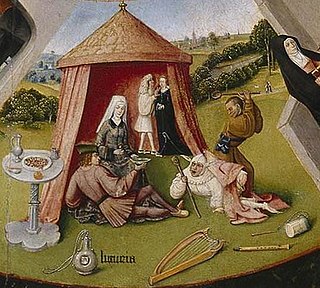
Lust is a psychological force producing intense desire for something, or circumstance while already having a significant amount of the desired object. Lust can take any form such as the lust for sexuality, money, or power. It can take such mundane forms as the lust for food as distinct from the need for food or lust for redolence, when one is lusting for a particular smell that brings back memories. It is similar to but distinguished from passion, in that passion propels individuals to achieve benevolent goals whilst lust does not.

Penance is any act or a set of actions done out of repentance for sins committed, as well as an alternate name for the Catholic, Lutheran, Eastern Orthodox, and Oriental Orthodox sacrament of Reconciliation or Confession. It also plays a part in confession among Anglicans and Methodists, in which it is a rite, as well as among other Protestants.

In Christian theology, charity is considered one of the seven virtues and was understood by Thomas Aquinas as "the friendship of man for God", which "unites us to God". He holds it as "the most excellent of the virtues". Aquinas further holds that "the habit of charity extends not only to the love of God, but also to the love of our neighbor".

Sloth is one of the seven deadly sins in Catholic teachings. It is the most difficult sin to define and credit as sin, since it refers to an assortment of ideas, dating from antiquity and including mental, spiritual, pathological, and conditional states. One definition is a habitual disinclination to exertion, or laziness. Views concerning the virtue of work to support society and further God's plan suggest that through inactivity, one invites sin: "For Satan finds some mischief still for idle hands to do.".

Purgatorio is the second part of Dante's Divine Comedy, following the Inferno and preceding the Paradiso. The poem was written in the early 14th century. It is an allegory telling of the climb of Dante up the Mount of Purgatory, guided by the Roman poet Virgil – except for the last four cantos, at which point Beatrice takes over as Dante's guide. Allegorically, Purgatorio represents the penitent Christian life. In describing the climb Dante discusses the nature of sin, examples of vice and virtue, as well as moral issues in politics and in the Church. The poem posits the theory that all sins arise from love – either perverted love directed towards others' harm, or deficient love, or the disordered or excessive love of good things.
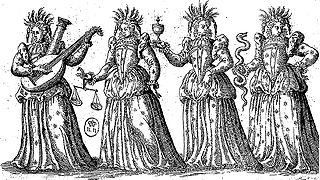
The cardinal virtues are four virtues of mind and character in both classical philosophy and Christian theology. They are prudence, justice, fortitude, and temperance. They form a virtue theory of ethics. The term cardinal comes from the Latin cardo (hinge); these four virtues are called “cardinal” because all other virtues fall under them and hinge upon them.
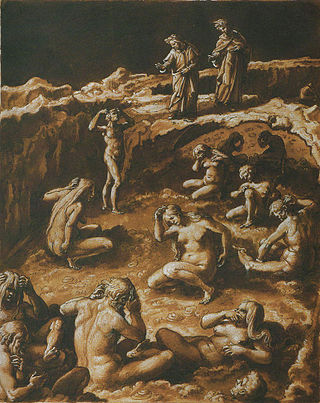
In Dante Alighieri's Inferno, part of the Divine Comedy, Malebolge or Fraud is the eighth circle of Hell. Roughly translated from Italian, Malebolge means "evil ditches". Malebolge is a large, funnel-shaped cavern, itself divided into ten concentric circular trenches or ditches. Each trench is called a bolgia. Long causeway bridges run from the outer circumference of Malebolge to its center, pictured as spokes on a wheel. At the center of Malebolge is the ninth and final circle of hell, known as Cocytus.

A gourmand is a person who takes great pleasure and interest in consuming particularly good food and drink. Gourmand originally referred to a person who was "a glutton for food and drink", a person who eats and drinks excessively.

The Summa Theologiae or Summa Theologica, often referred to simply as the Summa, is the best-known work of Thomas Aquinas (1225–1274), a scholastic theologian and Doctor of the Church. It is a compendium of all of the main theological teachings of the Catholic Church, intended to be an instructional guide for theology students, including seminarians and the literate laity. Presenting the reasoning for almost all points of Christian theology in the West, topics of the Summa follow the following cycle: God; Creation, Man; Man's purpose; Christ; the Sacraments; and back to God.
Catholic theology of sexuality, like Catholic theology in general, is drawn from "natural law", canonical scripture, divine revelation, and sacred tradition, as interpreted authoritatively by the magisterium of the Catholic Church. Sexual morality evaluates sexual behavior according to standards laid out by Catholic moral theology, and often provides general principles by which Catholics can evaluate whether specific actions meet these standards.

Inferno is the first part of Italian writer Dante Alighieri's 14th-century epic poem Divine Comedy. It is followed by Purgatorio and Paradiso. The Inferno describes the journey of a fictionalised version of Dante himself through Hell, guided by the ancient Roman poet Virgil. In the poem, Hell is depicted as nine concentric circles of torment located within the Earth; it is the "realm ... of those who have rejected spiritual values by yielding to bestial appetites or violence, or by perverting their human intellect to fraud or malice against their fellowmen". As an allegory, the Divine Comedy represents the journey of the soul toward God, with the Inferno describing the recognition and rejection of sin.
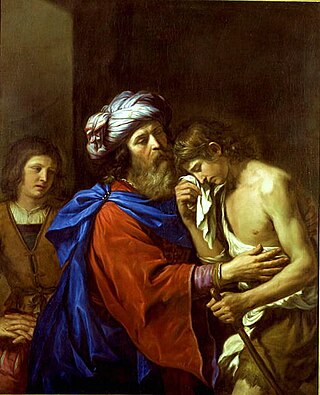
In Christianity, sin is an immoral act and transgression of divine law. The doctrine of sin is central to the Christian faith, since its basic message is about redemption in Christ.
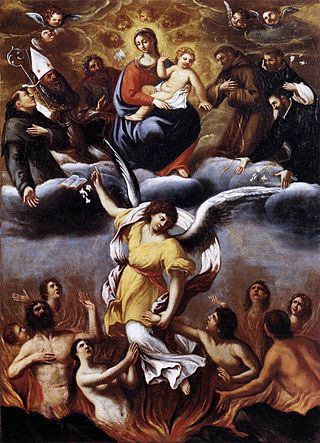
Purgatory is a passing intermediate state after physical death for purifying or purging a soul. A common analogy is dross being removed from metal in a furnace.
In Christian tradition, the love of money is condemned as a sin primarily based on texts such as Ecclesiastes 5:10 and 1 Timothy 6:10. The Christian condemnation relates to avarice and greed rather than money itself. The Christian texts (scriptures) are full of parables and use easy-to-understand subjects, such as money, to convey the actual message, there are further parallels in Solon and Aristotle, and Massinissa—who ascribed love of money to Hannibal and the Carthaginians. Avarice is one of the seven deadly sins in the Christian classifications of vices (sins). This is a phrase that was borrowed from Diogenes.

The third circle of hell is depicted in Dante Alighieri's Inferno, the first part of the 14th-century poem Divine Comedy. Inferno tells the story of Dante's journey through a vision of the Christian hell ordered into nine circles corresponding to classifications of sin; the third circle represents the sin of gluttony, where the souls of the gluttonous are punished in a realm of icy mud.

Catholic hamartiology is a branch of Catholic thought that studies sin. According to the Catholic Church, sin is an "utterance, deed, or desire," caused by concupiscence, that offends God, reason, truth, and conscience. The church believes sin is the greatest evil and has the worst consequences for the sinner, the world, and the l Catholic Church itself. Based on the Bible, the Catholic Church distinguishes between two kinds of sins: mortal sin and venial sin. The Catholic Church also distinguishes between the state of being in original sin and the commission of actual sin.



















